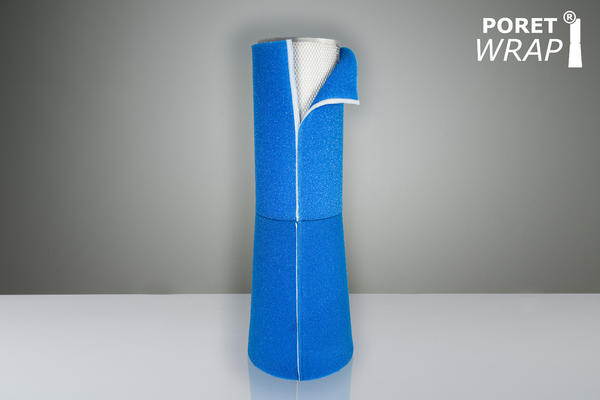

When evaluating a suitable coalescer, certain factors should definitely be considered more closely in the decision. By comparing the Poret® coalescer with conventional synthetic / glass fiber media, clear advantages of Poret® are visible:
| Poret® coalescer | Synthetic/Glassfibre Media |
| Pores remain open-celled |
Synthetic fibres block very fast |
| →Highly resistant to hydrolysis for an effective coalescing effect |
→Changing fibre structure in contact with water leads to bypasses |
| →Minimum increase of pressure drop |
→Massively increasing pressure drop |
| →Washable and reusable |
→Fibres affected by repeated washing |
In the following we explain this aspects in more detail.
The coalescer media Poret® shows a high dust holding capacity for coarse particles and protects the following filters.
Main reason is, that the pores of Poret® will remain open during operation, as the dust is captured in the inner surface area of the coalescer media.


In comparison to the Poret® Coalescer, glass fibre media gets totally blocked during a short time, which leads to unscheduled maintenance.
The pressure differential of synthetic or glass fibre media is increasing massively after a short while whereas the Poret® coalescer media offers an optimum balance of constantly filtration performance and minimum increase in pressure drop over their entire service life. Thereby the pressure differential will increase slowly and remain after while virtually constant.


PORET® removes entrained droplets from inlet air, preventing them from contaminating downstream filters. The physical mechanisms involved can be illustrated using the simple example of fog in ambient air.
Fog is composed of tiny microscopic water droplets approximately 10–40 micrometers (μm) in diameter. As these droplets are collected in the coalescer, they agglomerate and their average size and weight increase. No longer buoyant in air, these larger droplets are separated off downwards by gravity.
The coalescer media PORET® is reaching significantly efficient results by coalescing / agglomerating water droplets from the air.

The massive problems of glass-fibre media during operation are visible from the photograph above. The structure of the media is quite often collapsing and occurring bypasses, through which particles are easily passing.

Whereas visible from this picture, the Poret® coalescer media presents a sturdy shape during operation.
Of course glass / synthetic media is theoretically washable. But in praxis washing will damage the media structure which leads to decrease in filter efficiency.
PORET® is highly resistant to hydrolysis and easily washable and reusable for years, as visible from the picture, which presents a washing cycle after a sand strom.
